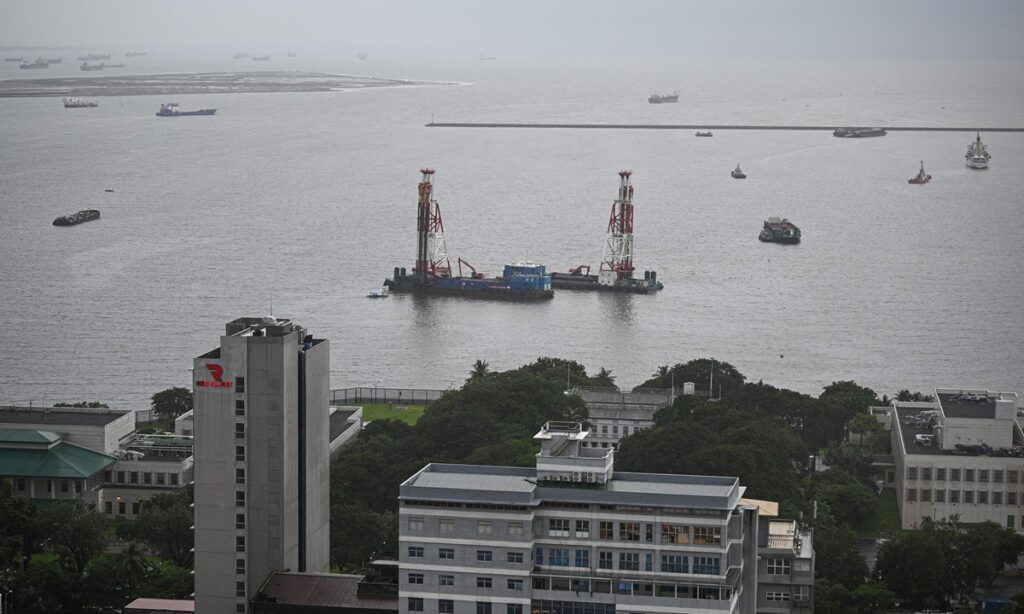The US embassy in the Philippines recently acknowledged that the US had held “discussions” with Philippine officials regarding ongoing construction projects in Manila Bay and that Washington had expressed its “concerns” to Manila about “the potential negative long-term and irreversible impacts to the environment” that the projects and other construction activities might have. To put it bluntly, it wanted the Philippines to stop the projects.
This behavior is outrageous and reflects the fact that the US has interfered in the internal affairs of the Philippines to such an extent that it has become unscrupulous. Manila Bay is located in the central part of the Philippines. It is a natural harbor west of the capital city of Manila and a well-known tourist attraction. It is understood that the Philippines attaches great importance to the huge projects in Manila Bay, and hopes that they will lead to local economic and social development. How to develop and protect its own national resources is the Philippine government’s internal affair, and the assessment of various factors, including the environment, can only be done by the Philippines. What does it have to do with the US? Does Manila need to report to Washington for approval?
The so-called impacts on the environment are purely an excuse. If the US really cares about them, it should have prevented Japan from forcibly dumping nuclear-contaminated wastewater, which will indeed have an “irreversible environmental impact” and affect the entire Pacific Ocean for many years. However, the US has not only given the green light and endorsement to Japan’s decision, but also helped the country engage in lobbying around the world. Based on this event alone, the US is simply not qualified to dictate environmental issues, not to mention the fact that the Manila Bay projects do not involve parties outside the Philippines, and those who really care about its environmental impact are the Philippine people, who will do a good job of evaluating and ensuring standards are met in all aspects.
In fact, Washington’s true intention over the projects in Manila Bay has been revealed. The reason why the US singles out these construction projects is that two of the projects are being implemented by the China Harbour Engineering Company and China First Highway Engineering Co. – both under the China Communications Construction Co. (CCCC) – together with Philippine companies and the City Government of Manila. The CCCC suffered illegal sanctions from the US a few years ago. Philippine Senator Francis Escudero pointed out, “Just because it [the US] blacklisted a company doesn’t mean we must also blacklist it automatically. Do we have such a treaty with America?”
The US embassy probably thinks of the Philippines as Hawaii and wants to weed out every element here that it doesn’t like, without any regard for Philippine sovereignty or the feelings of Filipinos. This is naked bully logic. Data show that in recent years, the number of export control measures taken by the US Department of Commerce, including the “Entity List,” has averaged 1,700 to 1,800 per year. It can be said that there are victims of US sanctions all over the world, and this is totally unreasonable. The unilateral sanctions imposed by the US are based on domestic law and without the authorization of the United Nations Security Council. They safeguard the selfishness and interests of the US and are not legally binding on other countries in accordance with international law.
The US, confident that no one can manage it, has failed to restrain its unilateral sanctions, which have already drawn widespread international discontent. Instead, it is now attempting to escalate them. As in this case, the US is asking other sovereign countries, such as the Philippines, to implement its blacklist. This is extremely arbitrary and unreasonable, and the Philippines has every right to ignore it. Manila canceled a decision to award a $10 billion airport project to the CCCC in 2021, and although the Philippine side said it had nothing to do with the US blacklist, there was widespread speculation in the industry that it was the result of pressure from the US. Two years on, the Philippines should be able to realize that such a decision has delayed the pace of infrastructure construction, and in the end, done more damage to the interests of the Philippines.
The CCCC was named the world’s third-largest construction company by Engineering News Record in 2022. It has world-class professional ability and is very reliable, so it is not by chance that so many countries have chosen this company for their big projects. If any country chooses to handle its own internal affairs according to the US blacklist, then it will first of all face chaos. Second, it – or more specifically, their own people – will suffer losses. Although the Philippines is an ally of the US, it is not a vassal state. It is necessary and feasible for the Philippines to stand up against US pressure on issues related to its sovereignty and national interests. Otherwise, one step back will lead to more steps back.
(Global Times)




